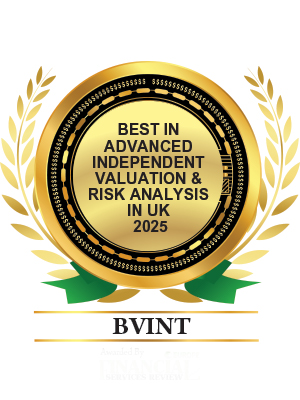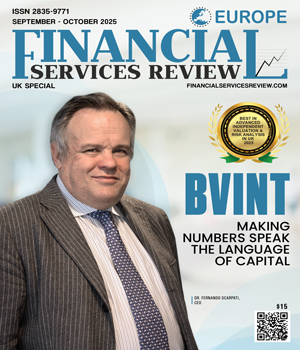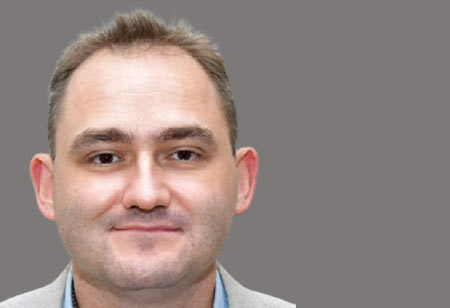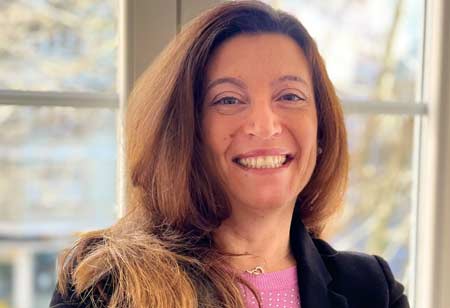Financial Services Review: Specials Magazine
In a world where funding is tight and uncertainty is high, the right valuation report can unlock growth— or block it. In today’s volatile and innovation-driven markets, valuation is no longer a back-office task—it is a strategic tool. Business Valuation International (BVINT) brings clarity to capital decisions across the full company lifecycle, from seed-stage startups and Series A scale-ups to pre-IPO and mature private equity-backed businesses. Instead of relying on static models and outdated methodologies, BVINT uses advanced tools like Monte Carlo simulations and real options pricing to map out future probabilistic scenarios and quantify risk. With deep sector expertise, a global presence, and a proven track record of helping founders raise capital, BVint delivers more than financial assessments. “BVint valuation is not just numbers — it is about confidence. And confidence moves capital,” says Dr. Fernando Scarpati, CEO. The company is delivering clarity, strategy, and investor-ready insight—at a time when founders / owners / CEOs / CFOs need it most. Behind every model is the weight of real-world expertise. BVINT’s team brings over two decades of experience across private equity, venture capital, investment banking, and global consulting. Having sat on both sides of the table, they understand what truly drives investor confidence. Importantly, BVint operates with complete independence—offering objective valuations that are free from fundraising mandates or transaction-driven incentives. This commitment to unbiased insight is supported by a global footprint, with offices in London, Geneva, Malta, and India, and an upcoming presence in Miami. The India office serves as the firm’s analytical powerhouse, staffed entirely by senior analysts who ensure speed, depth, and precision at every step. Every client engagement draws on this collective intelligence, grounded in practical experience and united by a shared mission to deliver insights that matter. “We give clients clarity on the volatility of key business drivers— insight others cannot provide without sophisticated probabilistic models,” says Dr. Scarpati. Armed with that clarity, founders and capital providers engage the market with sharper confidence and a story that resonates where it matters most; the future. Why Traditional Valuation Models Fall Short Traditional valuation models were built for an era dominated by tangible assets and predictable cash flows, but they struggle to capture the realities of today’s innovation-driven economy. Much of a company’s value now lies in intangible drivers—proprietary technology, customer data, intellectual property, brand equity, network effects, management strength, sustainability initiatives, and forward-looking milestones—elements that rarely show up on conventional financial statements or can be fully measured with backward-looking metrics. This gap is particularly evident in early-stage and high-growth companies, which are evaluated less on historical performance and more on what they are positioned to achieve in the future. Static, assumption-heavy models rooted in fixed forecasts are simply not built for such environments of uncertainty and rapid change. BVINT addresses these challenges with a modern, multi-dimensional approach designed for complexity and dynamism. By leveraging advanced tools like Monte Carlo simulations and real options pricing, BVint analyzes thousands of potential future scenarios to quantify both risk and opportunity. Rather than delivering a single-point estimate, this process reveals a full spectrum of possible outcomes grounded in real-world conditions and structured assumptions. It is especially powerful for early-stage businesses where historical data is limited; instead of penalizing founders for being new, BVint’s models highlight their upside potential while transparently integrating risk to build credibility with investors. The result is a valuation that doubles as a decision-making tool, helping businesses plan strategically, prepare for capital raises, and pivot with clarity.
Top Discretionary Investment Management Financial Institution in UK 2025
Over the past few decades, Global Investors have learned that prosperity is never without turbulence. Market crashes, sudden rebounds, and geopolitical shocks have shown that wealth needs as much protection as growth, and clarity, trust, and steady judgment through every cycle are the primary requirements for investors. Sustained by deep trust and enduring continuity, GK Wealth is built on relationships that span over two decades. GK Wealth is a discretionary investment management firm that deliberately avoids mass-market financial products and cookie-cutter strategies. Instead, it anchors its narrative on long-term client relationships, bespoke portfolio construction, and a principled stance against excessive risk or leverage. Its clients include institutions, family offices, and ultra-high-net-worth individuals, many introduced by long-standing relationships that extend across generations. The portfolios are built from the ground up, reflecting each client’s risk appetite, liquidity requirements, time horizons, and family priorities. With an open-architecture framework, the company draws on global markets without bias, guided by a multilingual team that strengthens accessibility. Tailored Portfolios, Not Packaged Products The company’s onboarding process goes beyond financial disclosures, addressing each client’s needs, liquidity, succession plans, and risk tolerance to deliver truly bespoke portfolios. “We partner with clients to help safeguard and build wealth across generations,” says Virna Kazazian, Founder and CEO at GK Wealth. It discourages excessive leverage and illiquid alternatives, aiming for clients to have the ability to remain invested through downturns and positioned to benefit if markets recover. It aims to ensure transparency and seeks to explain risks clearly before any investment decision is taken. Regular client interactions are undertaken to assess ongoing suitability and alignment with client objectives. Open Architecture and Disciplined Selection While many firms remain tied to proprietary products and partner agendas, GK Wealth distinguishes itself through an open-architecture approach. Investments are sourced globally without bias and are rigorously assessed against three non-negotiable criteria: liquidity, quality, and pricing. The firm prioritises assets with the potential to remain liquid and tradable across different market cycles, helping clients retain flexibility during turbulent periods. The firm recognises, however, that during sharp downturns liquidity often contracts and trading margins widen, making flexibility more challenging to preserve..
Payment Solution
Tides are shifting in the dynamic world of banking and payment, with clients seeking transparency, responsiveness and seamless digital experiences. In light of this, neobanks in France are making significant strides, capturing an impressive 10 to 15 percent market share annually. Leading this banking revolution is Noelse, a French payment establishment that offers innovative banking solutions for individuals and professionals. Understanding that clients want straightforward, accessible and tailored banking solutions, Noelse attracts customers with the promise of fully digital, simple, and transparent financial management. Users benefit from innovative app and web portal features, such as the ability to create sub-accounts to manage specific financial goals while providing unparalleled visibility and control over their cash flow. Standing out in the payments sector, Noelse is a neobank and a trusted partner supporting clients throughout their payment and cash collection needs. “With over 13 years of innovation and a dedication to exceptional care, we simplify the complexities from the banking world and ensure our clients have peace of mind, knowing their banking needs are met with expertise and stability,” says Adrien Fournier, Marketing Director.
CXO INSIGHTS

Investing and Data, the Opportunity and the Challenge
Fabiana Fedeli, Chief Investment Officer Equities, Multi Asset and Sustainability, M&G Investments

Technology in Financial Innovation
Luisa Marques, Head of Accounting, Banco Montepio
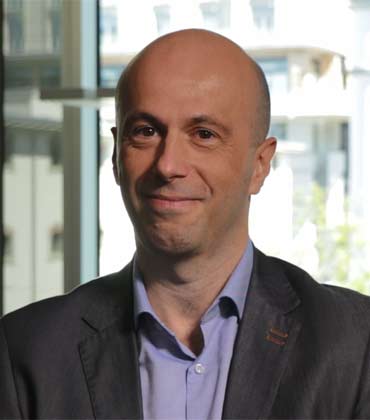
Transforming Financial Licensing Services and Industry Trends
Yvan Roduit, Head Investment Advisory, Raiffeisen Group
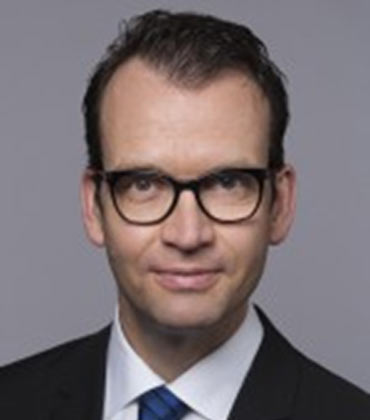
Data-driven Strategies Supporting Effective Conduct Risk Management in Wealth Management businesses
Stefan Rauch, Head of Compliance, VP Bank AG
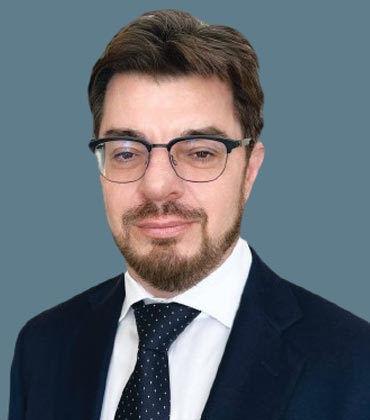
Esg Risk Management In Banking: Pragmatic Insights And Roadblocks
Yaroslav Sovgyra, Head of Credit Risk (ESG and Portfolio Management), Lloyds Banking Group
IN FOCUS
Precision Insight: Advanced Independent Valuation & Risk Analysis in the UK Market
Advanced independent valuation and risk analysis in the UK delivers objective asset pricing, regulatory confidence, and strategic risk mitigation by combining data, models, and expert governance.
Building Long-Term Value: UK Discretionary Wealth Solutions
UK discretionary investment managers provide tailored strategies that enhance long-term stakeholder value.
EDITORIAL
UK’s New Era of Independence and Risk Governance
The last 18 months have felt like a pressure-test for the valuation profession. A volatile macro backdrop, rising and then sticky interest rates, a slowing real-estate cycle in parts of the UK, and rapid technological change has exposed fault lines in how assets are priced, governed and stress-tested. At the same time regulators and standards-setters have moved from polite encouragement to explicit scrutiny: the old rules of thumb are being replaced by firmer requirements around independence, transparency and model governance.
Two regulatory trends are particularly consequential. First, professional standards are being tightened. RICS’s refreshed Red Book (the Global Valuation Standards) which takes effect in 2025 tightens reporting, competence and disclosure expectations for valuers operating in the UK market. That change brings renewed focus on documentation, scope of work, and the independence of judgment in complex or thinly traded markets.
Second, financial regulators notably the FCA and the PRA have elevated valuation practices to a systemic-risk issue. The FCA’s work on private market valuations flagged governance weaknesses in funds and valuation committees, and warned firms that conflict management and independent oversight must improve if investor confidence is to be preserved. The PRA’s recent reporting and business plans likewise underline the expectation that prudential valuations and stress frameworks be robust and auditable across banks and insurers. Where valuations feed capital, provisioning or investor returns, regulators are signalling they will intervene.
The valuation profession is being asked to modernise without losing its soul. Speed, scale and algorithmic sophistication are inevitable and useful, but they do not absolve the industry from its core responsibility: producing independent, well-reasoned estimates that stand up to scrutiny in good times and bad. The next era will reward firms that combine rigorous governance, transparent modelling, and muscular professional judgement. Those that treat valuation as a peripheral exercise will find themselves answering uncomfortable questions from auditors, trustees and ultimately regulators.
In this edition, we have featured insights from Dr. Artur Golban, Deputy Director of General Compliance and Internal Control, Victoriabank LW and Maria Azinhal, Compliance Deputy Manager at Caixa Geral de Depósitos. We have also showcased the in-depth, data-driven insights into future outcomes that Business Valuation International (BVINT) has been offering to help businesses manage risk, shape strategy, and secure funding.


